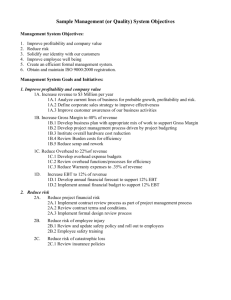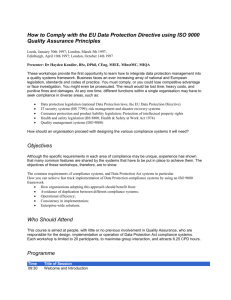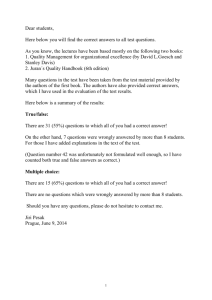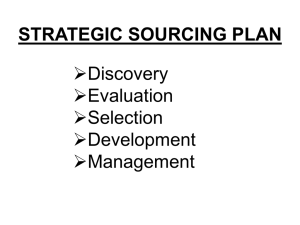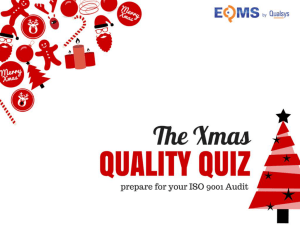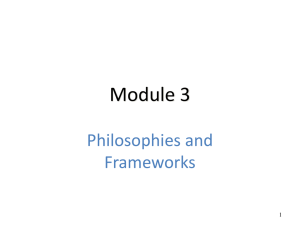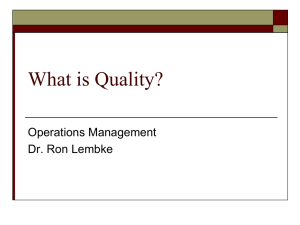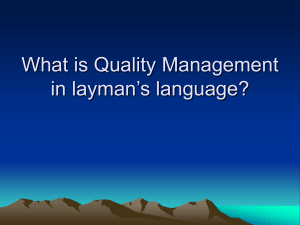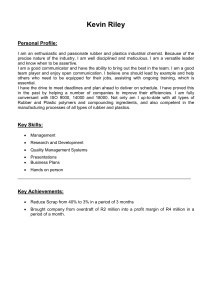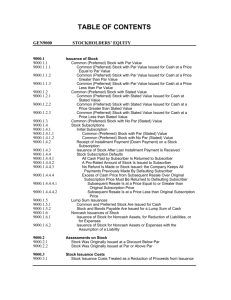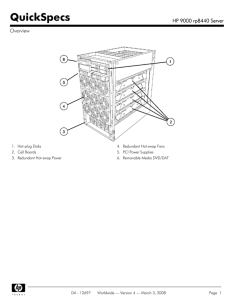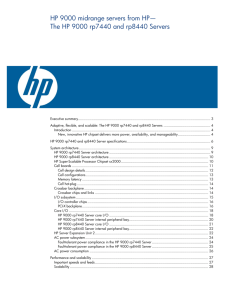ISO 9000 - Thames Productions
advertisement
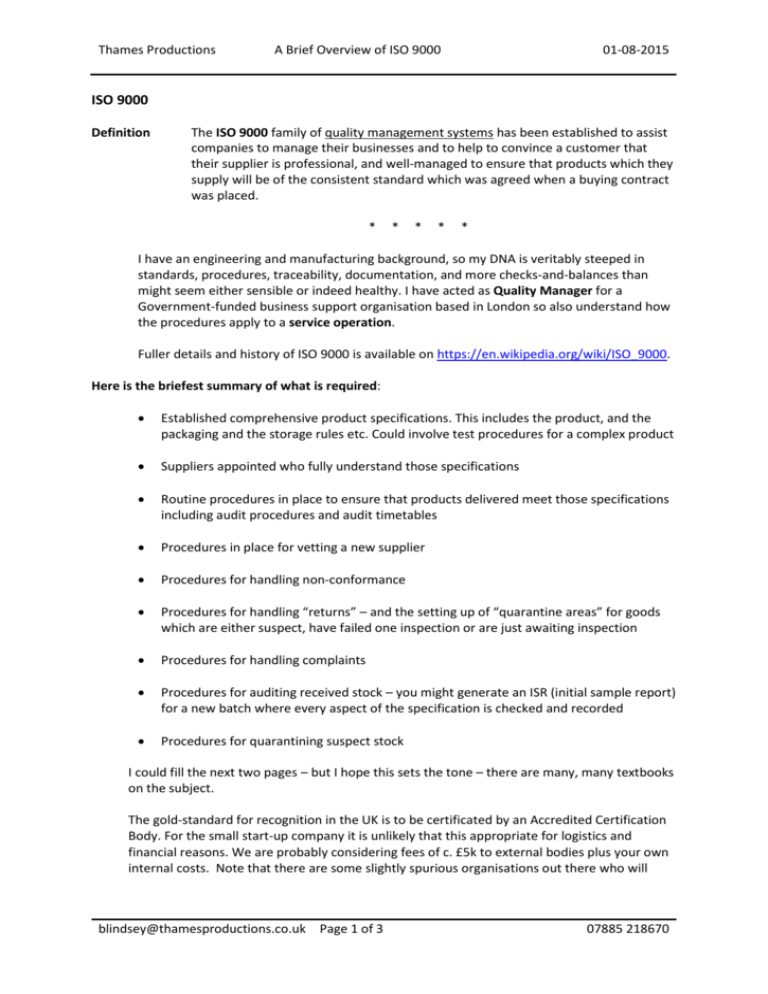
Thames Productions A Brief Overview of ISO 9000 01-08-2015 ISO 9000 Definition The ISO 9000 family of quality management systems has been established to assist companies to manage their businesses and to help to convince a customer that their supplier is professional, and well-managed to ensure that products which they supply will be of the consistent standard which was agreed when a buying contract was placed. * * * * * I have an engineering and manufacturing background, so my DNA is veritably steeped in standards, procedures, traceability, documentation, and more checks-and-balances than might seem either sensible or indeed healthy. I have acted as Quality Manager for a Government-funded business support organisation based in London so also understand how the procedures apply to a service operation. Fuller details and history of ISO 9000 is available on https://en.wikipedia.org/wiki/ISO_9000. Here is the briefest summary of what is required: Established comprehensive product specifications. This includes the product, and the packaging and the storage rules etc. Could involve test procedures for a complex product Suppliers appointed who fully understand those specifications Routine procedures in place to ensure that products delivered meet those specifications including audit procedures and audit timetables Procedures in place for vetting a new supplier Procedures for handling non-conformance Procedures for handling “returns” – and the setting up of “quarantine areas” for goods which are either suspect, have failed one inspection or are just awaiting inspection Procedures for handling complaints Procedures for auditing received stock – you might generate an ISR (initial sample report) for a new batch where every aspect of the specification is checked and recorded Procedures for quarantining suspect stock I could fill the next two pages – but I hope this sets the tone – there are many, many textbooks on the subject. The gold-standard for recognition in the UK is to be certificated by an Accredited Certification Body. For the small start-up company it is unlikely that this appropriate for logistics and financial reasons. We are probably considering fees of c. £5k to external bodies plus your own internal costs. Note that there are some slightly spurious organisations out there who will blindsey@thamesproductions.co.uk Page 1 of 3 07885 218670 Thames Productions A Brief Overview of ISO 9000 01-08-2015 provide a certificate which might not be recognised by some professional buyers (the test, usually, is “does it have a tick and a crown on it?) But there is a fall-back position. Where ISO 9000 certification is useful When you are selling to consumers via the www, it is extremely unlikely that a buyer would enquire about your ISO 9000 status. However, if you are trying to get on the supplier list of a company such as John Lewis, then there are some hoops to get through. Here is a simplified version of those hoops. It is likely that your application will have to be approved by four different functions – e.g. 1. The buyer You have convinced the buyer that this is a great product, the quality is right, the price is right, they like you and they like your company, and they want to place that very first order. However, there is a form to fill in for you to be added to the list of accredited suppliers – and there are a few other people who have to check you out: 2. The logistics manager They want to check the packaging – e.g. each item is individually boxed, there are 10 items to a carton and each store will order in a multiple of cartons, there is a specification of how high the cartons can be stored, and how many to a pallet. There is a bar-code on each box and on each carton. There is traceability between batches. You know that you have to deliver to your nearest Distribution Centre against a maximum and minimum delivery forecast. There is a spec for temperature and humidity of the storage area. There is a system in place for traceability – might be a batch number for example. 3. The finance department Traditionally they need to check the last three years audited accounts – might be a problem for that start-up. They will check that not only that you are profitable, but also that you have sufficient working capital, and any increase in sales to John Lewis can be funded (by you). 4. The Quality Manager They might ask: “does the supplier have ISO 9000 certification?” If the answer is “yes” (certified by a UKAS accredited body) they will ask for a copy of the current certificate. You supply this - Job finished. What could be easier? Getting through the pitfalls: Remember that you are trying to convince the interrogators that although small, you can supply the goods – always – to time – and to specification – and you can handle every eventuality. blindsey@thamesproductions.co.uk Page 2 of 3 07885 218670 Thames Productions A Brief Overview of ISO 9000 01-08-2015 Trying to look smart: When you’re asked about ISO 9000, it’s the buyer’s nightmare when your eyes glaze over and you obviously don’t know what this is! So you need to learn a little about it, and do some work so that you can respond something like this when asked: “As a small company, we don’t yet have ISO certification but we are aware of the requirements and we have written procedures in place which would meet the requirements of the Standards were we to be audited”. A question which often catches out the new supplier who hasn’t previously worked in the corporate world of supply will be: “Can you tell me what your complaints procedure is?” Here is something like a model answer: “We have a written complaints procedure in place and all our staff are made aware of it. Any complaint must be registered by email – or in writing – or registered on our website. We will give it a reference number, and allocate a named member of staff to investigate We will acknowledge receipt of the complaint within 24 hours We will use our best endeavours to resolve within 7 working days We will record every single activity in the investigation – telephone calls – e-mails etc. We will communicate our findings to the complainant We will look at the causes and determine whether changes have to be made to avoid a recurrence We will routinely review the level of complaints and their nature to determine any longterm changes required” Being on your toes You could be asked about product disposal, recycling, environmental considerations, and the wage-rates at your subcontractors. Know everything about those ethical questions – and make sure that your activities meet the required best practices. Summary: In some supplier situations, the buying company might make it mandatory that their suppliers have to have ISO 9000 accreditation. This would be particularly true with companies seeking subcontractors. But being aware of some of the disciplines will be both useful in running your company and impressing companies of your suitability for being a reliable supplier Bob Lindsey © 2015 ****************************************************** blindsey@thamesproductions.co.uk Page 3 of 3 07885 218670
